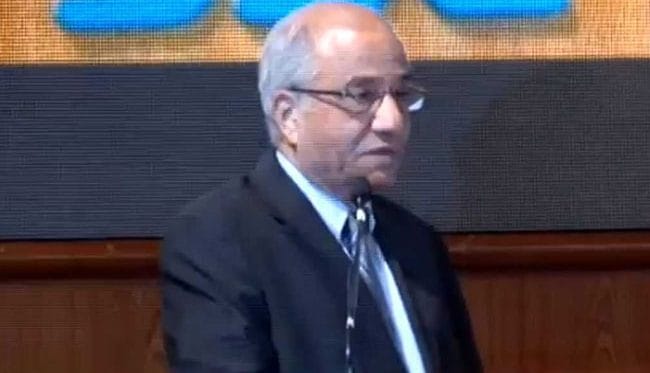The retired judge admits the committee faced pressure from business and trade, tries to allay fears over proposed amendments to the RTI Act.
New Delhi: Justice B.N. Srikrishna (retd), chairman of the committee that drafted the controversial Personal Data Protection Bill, has acknowledged that certain differences in opinion “may have” existed among its members.
The committee’s draft bill and an accompanying report have drawn intense criticism, at times even from its own members, for the observations and recommendations made on data localisation, Aadhaar, and proposed amendments to the RTI Act.
However, in an email interview to ThePrint, Srikrishna played down these differences of opinion, saying: “In any committee that is run democratically, each member may have a different view, but ultimately the decision is a collective one with which everyone concurs. As with any collective decision, it eschews extremes and takes a middle path with which everyone can identify. Our committee was no exception. Two members, however, had reservations as they wanted to put forth their views uncompromisingly.”
He also admitted that there was “intense lobbying by business and trade”, and played down fears over the proposed changes to the RTI Act, saying media reports on the topic are “overreaction based on misunderstanding the proposed amendment”.
Also read: Data protection report ready but still no agreement on including Aadhaar
Discordant notes
The report accompanying the bill features an email a member of the committee, Prof. Rishikesha T. Krishnan, director of IIM Indore, sent to Srikrishna.
Citing his reservations, he wrote: “The requirement that every data fiduciary should store one live, serving copy of personal data in India is against the basic philosophy of the internet, and imposes additional costs on data fiduciaries without a proportional benefit in advancing the cause of data protection.”
Another point Krishnan made was: “The observations and recommendations regarding the Aadhaar Act are outside the scope of the committee’s work.”
Even before the bill was officially announced, there were reports of industry bodies threatening a note of dissent. The threat was made good in the form of a note from the Data Security Council of India, an initiative of NASSCOM, which is also included in the report.
In the note, Rama Vedashree, CEO of DSCI, another member of the data protection committee, says the proposed restrictions to cross-border flow of personal data are “not only regressive, but against the fundamental tenets of our liberal economy”.
Also read: What harm can you do to me if you have my Aadhaar details, asks Trai chairman R.S. Sharma
However, in response to NASSCOM’s unhappiness, an unmoved Srikrishna said: “Even vested interest always tries to protect its turf and there is always intense lobbying by business and trade to lessen the impact of any law on their interests. I suppose this act would be no exception to the general pattern.”
The Aadhaar question
Srikrishna said he is not willing to comment on the Aadhaar case pending in the Supreme Court, as it is “still sub judice”. Asked what he hoped the outcome of the case would be, he said: “Any comment made by me would depend on the constitutional validity of that act that is pending decision.”
However, the committee has already made its recommendations on the Aadhaar Act, which falls outside the purview of its assignment. The data protection report says on page 101: “…First, the UIDAI must be autonomous in its decision-making, functioning independently of the user agencies in the government and outside it, that make use of Aadhaar; second, the UIDAI must be equipped with powers akin to a traditional regulator for enforcement actions.”
If the Aadhaar judgment is in dissonance with the data protection recommendations, Justice Srikrishna said the latter would override any other law.
“The data protection act is an overarching act and its provisions would override the provision in any other law to the extent of inconsistency. If there is no inconsistency or conflict, its provisions have to be read in addition to other laws,” he said.
RTI amendments
On proposed amendments to the RTI Act, media reports have claimed they could be used by crooked public officials to deny access to information (“personal data”), citing “harm” as defined in the data protection bill. Harm, as per the committee recommendations, can mean anything from “bodily or mental injury”, to “humiliation”, to “any observation or surveillance that is not reasonably expected by the data principal”.
However, Srikrishna called these reports an “overreaction”.
“The Supreme Court has declared the right to information under RTI as a fundamental right founded in free speech; it has also declared in the Puttaswamy judgment that privacy is a fundamental right founded in the right to life,” Srikrishna said.
“When there is a tension between two fundamental rights, both of which are important, a necessary compromise has to be worked out keeping the objectives of both in mind. It would be futile to over-emphasise one to the detriment of the other.
“The proposed amendment to RTI Act reflects that compromising balance in the clash of the titans,” he said.
Personal experience
Srikrishna seems to be every government’s favourite retired judge — he has headed seven committees since he retired from the Supreme Court in 2006.
Asked how the experience of chairing this committee was compared to his previous experiences, he said: “Each one presented a different challenge as it was on a different subject. I have enjoyed every one of them. The present one was perhaps most challenging for the sheer novelty of the issue.”






